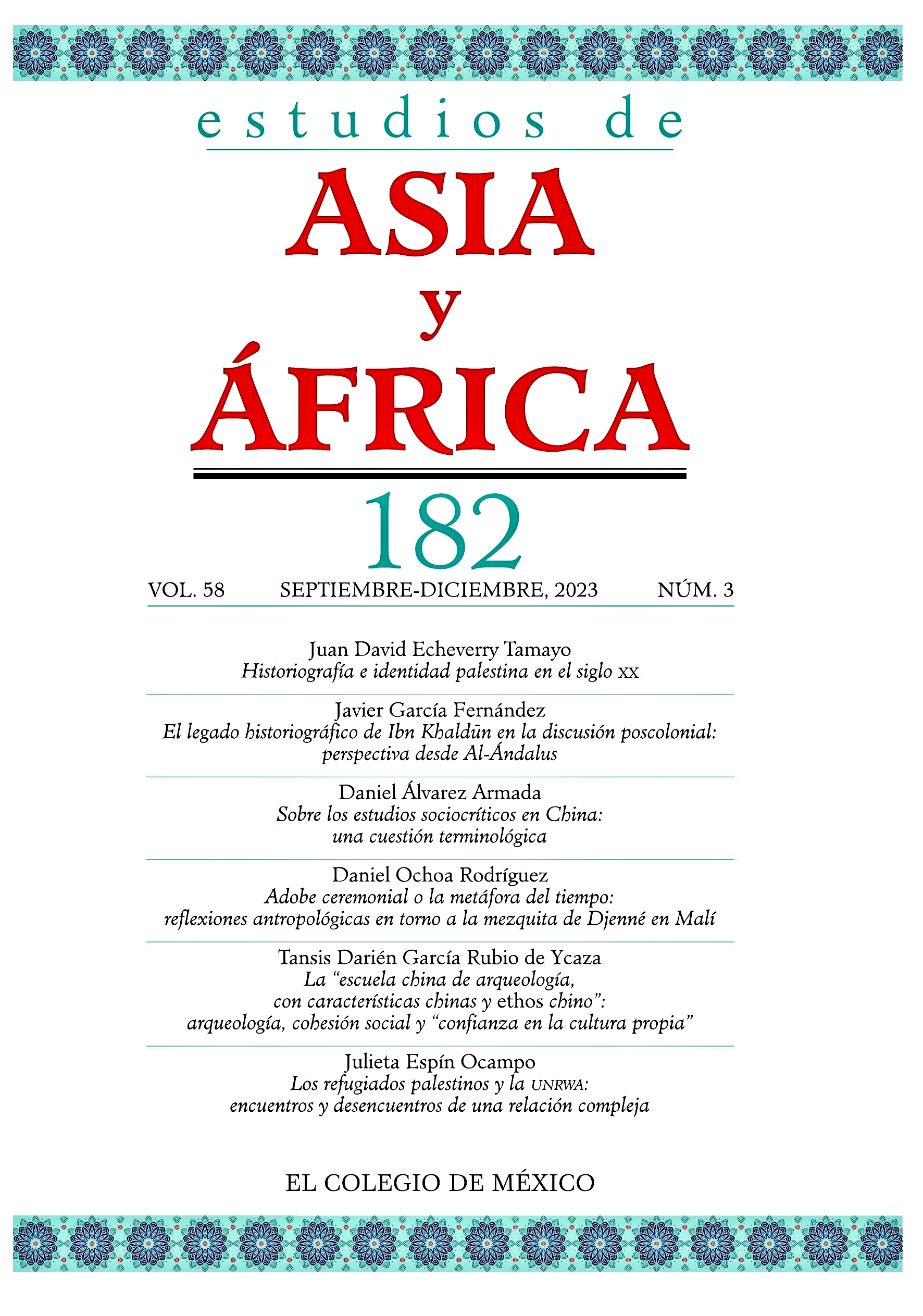Resumen
El presente artículo analiza los principales factores condicionantes de la relación entre la UNRWA y los refugiados palestinos, marcada desde sus inicios por la desconfianza de éstos respecto a las intenciones últimas (el asentamiento definitivo en los lugares de acogida) de la agencia y sus donantes, así como por el reclamo palestino de que ésta permanezca hasta que el derecho al retorno se ejerza. La dedicación exclusiva de esta organización a favor de la mayoría del pueblo palestino, su permanencia como garante de su condición de refugiados y el que prácticamente la totalidad de sus 30 000 empleados sean también refugiados condicionan una relación estratégica para una de las cuestiones más sensibles del conflicto árabe-israelí: el presente y futuro de esta comunidad en el exilio.
Referencias
Al Husseini, Jalal. 1997. “UNRWA and the Palestinian Nation-Building Process in the West Bank and the Gaza Strip”. Ponencia presentada en la conferencia internacional The Peace Process and Future Visions of the Middle East. Lund University, Suecia, 19-21 de septiembre de 1997.
Al Husseini, Jalal. 1998. “Political Dimensions of Relief and Development Activities in the Context of the PLO-Refugees-UNRWA Relations”. En UNRWA: A History within History. Special Focus on Humanitarian Aid and Development, editado por Riccardo Bocco. Amán: Centre d’études et de recherches sur le Moyen-Orient contemporain
Al Husseini, Jalal. 2003. “L’UNRWA et les réfugiés palestiniens. Enjeux humanitaires, intérêts nationaux”. Revue d’études palestiniennes 86 (nouvelle série): 71-85. https://halshs.archives-ouvertes.fr/halshs-00383723
Arasoughly, Alia, ed. 2000. Witness to History: The Plight and Promise of the Palestinian Refugees. Jerusalén: Miftah. The Palestinian Initiative for the Promotion of Global Dialogue and Democracy.
Badil Resource Centre. 2000. “UN Relief and Works Agency for Palestine Refugees (UNRWA) Nominated for the Nobel Peace Prize”. 23 de mayo de 2000. https://www.badil.org/press-releases/2459.html
Bocco, Riccardo y Jean Hannoyer. 1997. “L’UNRWA, les Palestiniens et le processus de paix : perspectives de recherche”. Palestine, Palestiniens, territoire national, espaces communautaires, dirigido por Riccardo Bocco, Blandine Destremau y Jean Hannoyer, 103-110. Beyrouth: Centre d’études et de recherches sur le Moyen-Orient contemporain.
Brand, Laurie A. 1988. Palestinians in the Arab World. Institution Building and the Search for State. Nueva York: Columbia University Press.
Chatty, Dawn y Gillian Hundt. 2000. Children and Adolescents in Palestinian Households: Living with the Effects of Prolonged Conflict and Forced Migration. Oxford: Universidad de Oxford.
Comellas, José Luis. 1993. Historia de España contemporánea. Madrid: Rialp.
Farah, Randa Rafiq. 1998. “UNRWA in a Popular Memory: al-Ba’qa Refugee Camp as a Case-study”. En UNRWA: A History within History. Special Focus on Humanitarian Aid and Development, editado por Riccardo Bocco. Amán: Centre d’études et de recherches sur le Moyen-Orient contemporain.
Farah, Randa Rafiq. 1999. “Paradoxical and Overlapping Voices: The Refugee-UNRWA Relationship and Palestinian Identity in Jordan”. Ponencia presentada en el simposio internacional The Palestinian Refugees and UNRWA in Jordan, the West Bank and Gaza, 1949-1999. Mar Muerto, Jordania, 21 de agosto de 1999.
Farah, Randa Rafiq. 2010. “Uneasy but Necessary: The UNRWA Palestinian Relationship”. Al Shabaka. https://al-shabaka.org/briefs/uneasy-necessary-unrwa-palestinian-relationship/
Gayosso, Felipe. 2020. “‘El jugador de dados’, un poema de Mahmud Darwis”. Estudios de Asia y África 55 (1): 167-190. https://doi.org/10.24201/eaa.v55i1.2584
Hart, Jason. 1999. “Whose Future is it Anyway? Children, UNRWA and ‘The Nation’”. Ponencia presentada en el simposio internacional The Palestinian Refugees and UNRWA in Jordan, the West Bank and Gaza, 1949-1999. Mar Muerto, Jordania, 21 de agosto de 1999.
Irfan, Anne Elizabeth. 2018. “Internationalising Palestine: UNRWA y Palestinian Nationalism in the Refugee Camps, 1967-82”. Tesis de doctorado, The London School of Economics and Political Science.
Joint Parliamentary Middle East Councils Commission of Enquiry — Palestinian Refugees. 2001. Right of Return. Londres: Labour Middle East Council. http://prrn.mcgill.ca/research/papers/returnbook.pdf
Karmi, Ghada y Eugene Cotran, eds. 1999. The Palestinian Exodus 1948-1998. Reading: Ithaca Press.
Lindholm Schulz, Helena. 2003. The Palestinian Diaspora. Londres: Routledge.
Malkki, Liisa H. 1996. “Speechless Emissaries: Refugees, Humanitarianism, and Dehistoricization”. Cultural Anthropology 11 (3): 377-404. https://doi.org/10.1525/can.1996.11.3.02a00050
Martínez Montávez, Pedro, ed. 1958. Poesía árabe contemporánea. Madrid: Escelicer.
Martínez Montávez, Pedro, ed. 1980. El poema es Filistín (Palestina en la poesía árabe actual). Madrid: Molinos de Agua.
Mustafa, Riyad. 1997. “The Culture of UNRWA Organization and the Palestinians in Jordan: The Education Programs as a Case-Study”. Ponencia presentada en el simposio internacional UNRWA. A History within History. Special Focus on Oral History and Popular Memory. Amán, Jordania, 25 de agosto de 1997.
Nauert, Heather. 2018. “On U.S. Assistance to UNRWA”. U.S. Department of State, 31 de agosto de 2018. https://2017-2021.state.gov/on-u-s-assistance-to-unrwa/index.html
Sayigh, Rosemary. 1998. “Dis/Solving the ‘Refugee Problem’”. Middle East Report 207 (Verano de 1998). https://merip.org/1998/06/dissolving-the-refugee-problem/
Schiff, Benjamin N. 1995. Refugees unto the Third Generation: UN Aid to Palestinians. Siracusa: Syracuse University Press.
Shiblak, Abbas. 1996. “Residency Status and Civil Rights of Palestinian Refugees in Arab Countries”. Journal of Palestine Studies 25 (3): 36-45. https://doi.org/10.2307/2538257
Tamari, Salim y Elia Zureik. 1996. The UNRWA Archives on Palestinian Refugees. Jerusalén: Institute of Palestine Studies.
The Star. 2000. “French Anthropologists, Media Experts Debunk UNRWA’S Archival Images of Palestinian Refugees”. 21 de septiembre de 2000.
UNRWA (United Nations Relief and Works Agency for Palestine Refugees in the Near East). 2000. UNRWA Annual Report of the Commissioner-General. https://www.un.org/unispal/document/auto-insert-183382/
UNRWA (United Nations Relief and Works Agency for Palestine Refugees in the Near East). 2001. Al Sada. Amán: UNRWA.
UNRWA (United Nations Relief and Works Agency for Palestine Refugees in the Near East). 2018. “Global Campaign Dignity is Priceless”. https://www.unrwa.org/sites/default/files/dip_cam-paign_factsheet.pdf
UNRWA (United Nations Relief and Works Agency for Palestine Refugees in the Near East). 2022a. “What We Do”. https://www.unrwa.org/what-we-do
UNRWA (United Nations Relief and Works Agency for Palestine Refugees in the Near East). 2022b. “UN Agency for Palestine Refugees Announces 2022 Budget”. https://www.unrwa.org/newsroom/press-releases/un-agency-palestine-refugees-announces-2022-budget
UNRWA (United Nations Relief and Works Agency for Palestine Refugees in the Near East). 2022c. “Where We Work” (Syria). https://www.unrwa.org/where-we-work/syria
Weighill, Luise. 1995. “The Future of Assistance to Palestinian Refugees”. Asian Affairs 26 (3): 259-269. https://doi.org/10.1080/714041284
Weighill, Marie-Luise. 1997. “Palestinians in Lebanon: The Politics of Assistance”. Journal of Refugee Studies 10 (3): 294-313. https://doi.org/10.1093/jrs/10.3.294
Esta obra está bajo una licencia internacional Creative Commons Atribución-NoComercial-SinDerivadas 4.0.
Derechos de autor 2022 Estudios de Asia y África



